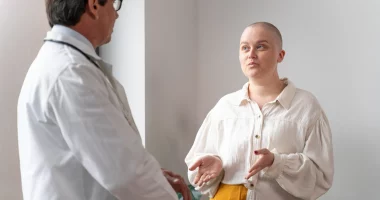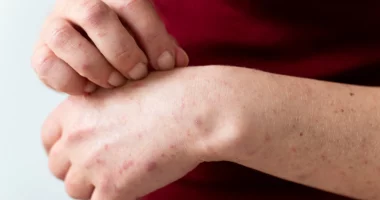Alpha-1 antitrypsin deficiency (AATD) is a condition that you get from your parents, and it can make it easier for you to get sick, especially with lung and liver problems. This happens because your body doesn’t make enough of a special protein called alpha-1 antitrypsin (AAT) that protects your body.
AATD is found all around the world, but how many people have it can be different in different groups of people. It’s more common in people with European ancestry, with about 1 in 1,500 to 3,500 people affected.
Sometimes, people with AATD might be mistaken as having asthma or not diagnosed at all, which can be confusing. The signs of AATD can be different depending on what problems it causes, so it’s important to get checked carefully by a doctor.
While there’s no cure for AATD yet, there are things that can help manage it. Staying away from certain things that can hurt your lungs and getting special treatments can help slow down how fast the condition gets worse.
Symptoms
The signs of AATD can be different for each person. Some people might not feel anything wrong at all. Usually, the first signs show up when people are between 20 and 50 years old.
The early signs might include:
- Feeling like you can’t breathe well
- Getting tired quickly during physical activities
- Making wheezing sounds when you breathe
- Losing weight without trying
- Getting sick a lot, especially with lung infections
- Feeling really tired
- Having a fast heartbeat
- Getting diseases like emphysema, jaundice, or cirrhosis, which affect the lungs or liver
Most of the time, the symptoms are problems with the liver or lungs. Most people with AATD, about 80% to 99%, have issues with their lungs getting sick and liver problems.
Sometimes, in very infrequent cases, a person might get skin problems like panniculitis, which is when the fat under your skin gets inflamed. But this doesn’t happen often, only in about 1 in 1,000 individuals with a severe form of AATD.
Causes
AATD happens because of changes, kind of like mistakes, in a special gene known as the SERPINA1 gene. This gene’s job is to make a protein called AAT that helps protect your body. But when there’s a problem with this gene, your body can’t make sufficient AAT protein.
Normally, your liver makes AAT and sends it to different parts of your body, like your lungs, through your blood. AAT helps your body stay safe from getting hurt or inflamed by your immune system when it’s too active. But without enough AAT, your body can get damaged more easily.
This condition is something you inherit, which means you get it from your parents through your genes. If both your parents pass on a gene with a problem to you, then you’ll have AATD. Sometimes, even if you only get one gene with a problem, you might still have some issues with AATD.
Treatment
Right now, there’s no way to completely get rid of AATD. But doctors can help slow down the damage it causes to your body and treat the problems it brings.
The treatment you get depends on what issues you have and how bad they are. It’s important to work with a team of doctors who specialize in the parts of your body that are affected by AATD. This way, you can get the right treatment for each problem.
One treatment specifically for AATD is called augmentation therapy. This involves getting a special protein called alpha1-proteinase inhibitor through a drip. It’s taken from blood donors and helps add more of the protective protein to your blood, which can slow down the damage to your organs. Usually, you’ll need to get these drips regularly, maybe once a week, for your whole life.
Doctors will also treat any problems with your lungs or liver caused by AATD just like they would treat those issues on their own. For example, if you have emphysema because of AATD, the treatment will be the same as for other kinds of lung problems like COPD.
Depending on how AATD affects you, you might need other treatments too, like:
- Getting extra oxygen to help you breathe
- Using special medicines to open up your airways
- Taking inhaled steroids to reduce inflammation in your lungs
- Going to a program to help you get stronger and breathe better
- Possibly even having surgery to replace damaged lungs or liver
Doctors might also suggest some changes to your lifestyle to help keep you healthy. They might say you should quit smoking or cut down on how much you smoke. It’s also a good idea to stay away from other people’s smoke and not drink too much alcohol. And they might recommend doing regular exercise to keep your lungs strong and working well.
Diagnosis
Getting diagnosed with AATD might take a bit of time because the symptoms can show up differently for each person. Some individuals might not even know they have it until they’re around 30 or 40 years old and start having trouble with their lungs, especially if they smoke.
In 2020, a review said that AATD often doesn’t get diagnosed enough. They suggested testing certain groups of people who might be more likely to have it, like those with COPD, liver problems, asthma that doesn’t get better with treatment, certain autoimmune conditions, or problems with their skin or bronchial tubes.
To figure out if someone has AATD, doctors can do a few tests:
- They’ll ask about your health history and check you over to see if there are any signs that point to AATD, like if you smoke or if anyone in your family has lung or liver problems.
- They might do a blood test to check how much AAT protein you have in your blood. Or they might do a genetic test to see if you have the gene for AATD.
- If you have lung problems because of AATD, they might do tests to see how well your lungs are working and if there are any other issues going on with them. They might take pictures of your lungs or do tests to see how much air you can breathe in and out.
These tests can help doctors figure out if you have AATD and what kind of treatment might help you feel better.
Life Expectancy
How long someone with AATD lives can be different for each person. It depends on things like when they find out they have it, how their lungs or liver get worse over time, and how well they can manage it with medication and lifestyle changes.
A study from 2018 found that most individuals with a severe form of AATD don’t live as long as people who don’t have it.
But if AATD is caught early and treated well, it can help you live longer. Treatment and making changes like not smoking, not drinking too much, and avoiding things in the environment that can hurt your lungs can all help.
If someone with AATD responds to treatment, takes care of their lungs and liver, and makes healthy choices, they can usually expect to live a good, long life.
Summary
In short, AATD is a rare condition caused by genes that make your body produce too little of a protective protein called AAT. This can hurt your lungs and liver.
A lot of people don’t show any signs until they’re grown-ups, and some never do. But when symptoms do happen, they usually affect the liver or lungs, causing liver problems or emphysema.
Finding out you have AATD early is really important so you can start treating it right away.
Treatment usually means getting special protein drips called Prolastin and changing some things in your life to stay healthy.
External Links








